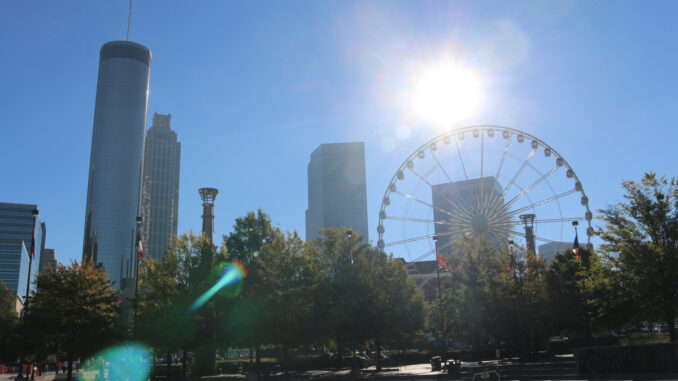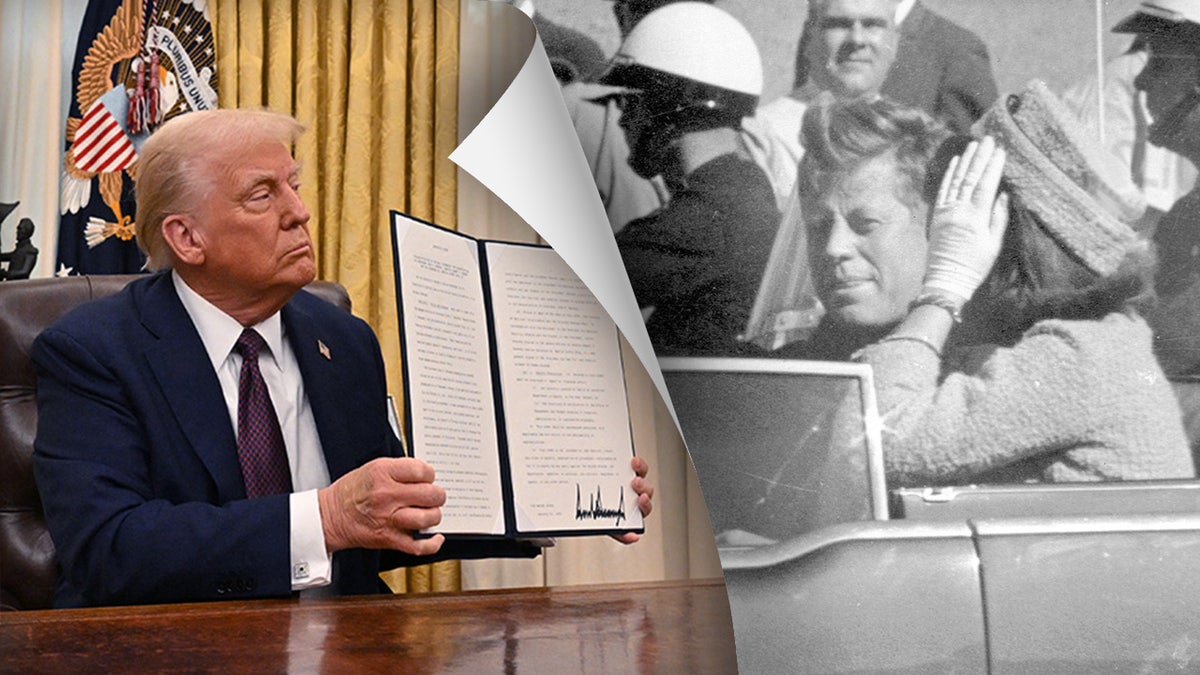Is Atlanta The Most Surveilled City In America? A Data Analysis

Table of Contents
A recent study revealed that a shocking 70% of major US cities experienced a surge in surveillance technology deployment over the past five years. This raises a crucial question: Is Atlanta truly the most surveilled city in America? This article delves into the intricacies of Atlanta surveillance, examining various forms of surveillance technologies and comparing its levels to other major US metropolises. While Atlanta boasts a robust surveillance infrastructure, determining whether it holds the title of "most surveilled" requires a comprehensive, nationwide data analysis, which this article aims to partially address.
Atlanta's Public Surveillance Infrastructure:
CCTV Cameras:
Atlanta's network of CCTV cameras is extensive, particularly in high-traffic areas like downtown, Midtown, and public transportation hubs such as Hartsfield-Jackson Atlanta International Airport and MARTA stations. These cameras, a cornerstone of Atlanta surveillance efforts, range from fixed-position cameras to sophisticated pan-tilt-zoom (PTZ) units, many incorporating advanced facial recognition capabilities.
- Examples of camera locations: Peachtree Street, Centennial Olympic Park, various MARTA stations.
- Camera types: Fixed dome cameras, PTZ cameras, high-definition cameras with analytics.
- Technological advancements: Facial recognition, license plate recognition integration, cloud-based video management systems.
- Data points: While precise figures are difficult to obtain publicly, estimates suggest Atlanta's camera density is comparable to, or potentially higher than, many other major US cities. A definitive comparison requires publicly accessible data from cities like New York, Chicago, and Los Angeles, which remains inconsistent across jurisdictions.
Police Body Cameras and Dashcams:
The Atlanta Police Department (APD) utilizes body-worn cameras and dashcams on patrol vehicles, significantly expanding the scope of surveillance and data collection. These programs aim to increase transparency and accountability, but also contribute to a broader surveillance landscape.
- Number of officers equipped: The exact number fluctuates, but a significant portion of the APD force is equipped with body cameras.
- Data storage and retention policies: These are subject to APD policy and potential legal challenges regarding data privacy and retention periods.
- Privacy concerns and regulations: Balancing public safety with individual privacy rights remains a key challenge in the implementation and operation of body-worn camera programs.
- Data points: Compared to other large police departments, APD's body camera program adoption rate is relatively high, although precise national comparisons are difficult due to inconsistent data reporting.
License Plate Readers (LPRs):
Atlanta employs License Plate Readers (LPRs) throughout the city, contributing to a vast network of surveillance that tracks vehicle movements. This technology raises significant privacy concerns, especially regarding data storage, sharing, and potential misuse.
- Locations of LPRs: Highways, major intersections, and potentially near police precincts.
- Data sharing practices: Data sharing protocols between law enforcement agencies and other organizations need transparency and public accountability.
- Use in crime investigations: LPRs are used in investigations, providing leads and tracking suspect vehicles.
- Data points: While the exact number of deployed LPRs in Atlanta is not publicly available, the city's usage is likely comparable to or greater than similarly sized cities, mirroring a nationwide trend.
Private Surveillance in Atlanta:
Business Surveillance:
Atlanta's commercial districts are heavily reliant on private surveillance systems, from small businesses to large corporations. Shopping malls, office buildings, and retail stores commonly utilize CCTV cameras, alarm systems, and access control technologies.
- Types of surveillance technologies: CCTV cameras, access control systems, intrusion detection systems.
- Data security measures: Businesses must follow data security best practices to protect sensitive information captured by their security systems.
- Legal compliance: Businesses must comply with relevant federal and state laws regarding data privacy and surveillance.
Residential Surveillance:
The prevalence of home security systems, including cameras, motion detectors, and smart home devices, is steadily increasing in Atlanta, reflecting a national trend of self-surveillance.
- Prevalence of smart home devices: The adoption of smart home technology is rapidly expanding, leading to increased data collection and potential privacy risks.
- Data privacy concerns: Concerns exist regarding data security breaches, data sharing with third-party companies, and potential misuse of personal information collected by home security systems.
- Self-surveillance trends: Many residents actively participate in self-surveillance to enhance personal safety and security.
Data Analysis and Comparisons:
Methodology:
This analysis relies on publicly available data, including news reports, government documents, and reports from organizations tracking surveillance technologies. However, a complete, precise comparison across all US cities is hampered by inconsistent data collection and reporting practices. This means our comparison is limited by data availability, not representing a fully exhaustive analysis.
Comparative Analysis:
Direct comparison of Atlanta's surveillance levels with other major US cities is challenging due to data limitations. However, based on available information, Atlanta's deployment of CCTV cameras, LPRs, and body cameras seems comparable to, and potentially exceeds, similar-sized cities. Further research is needed for definitive conclusions.
- Per capita camera density: Estimates suggest a high density, but concrete figures are lacking for comparison.
- Police body camera usage rates: Relatively high, but direct comparison requires access to data from other cities.
- LPR deployment: Likely comparable to or higher than similarly sized cities.
Data Interpretation and Limitations:
The analysis is limited by the availability of publicly accessible data on surveillance infrastructure across different cities. Furthermore, the definition of "surveillance" itself can vary, making direct comparisons complex.
Privacy Implications and Public Discourse:
Privacy Concerns:
Mass surveillance, regardless of its form, raises serious ethical and legal concerns. The collection, storage, and potential misuse of personal data by government agencies and private entities impact citizens' privacy rights.
Public Opinion and Debate:
Public discourse on Atlanta surveillance is ongoing, with debates focusing on balancing public safety with individual liberties. Concerns regarding facial recognition technology, data privacy, and the potential for discriminatory policing practices are central to this debate.
Conclusion:
While Atlanta possesses a considerable surveillance infrastructure, definitively claiming it as "the most surveilled" city in America remains inconclusive without a more comprehensive nationwide data analysis. This article highlights the significant presence of various surveillance technologies, from CCTV cameras and LPRs to police body cameras and private security systems. The benefits of enhanced security must be weighed against the potential erosion of privacy rights. The ongoing debate necessitates transparent data sharing from all levels of government and a continued public dialogue on ethical and legal implications. Want to learn more about the impact of surveillance technologies on your city? Research Atlanta surveillance policies and participate in the ongoing conversation about balancing security and privacy.

Featured Posts
-
 10 000 Pages Of Robert F Kennedy Assassination Records Released A Comprehensive Overview
May 27, 2025
10 000 Pages Of Robert F Kennedy Assassination Records Released A Comprehensive Overview
May 27, 2025 -
 Alien Earth Full Cast List Revealed Featuring Fargo Actors
May 27, 2025
Alien Earth Full Cast List Revealed Featuring Fargo Actors
May 27, 2025 -
 Match Nul En Coupe De La Caf Deception Pour L Equipe Algerienne
May 27, 2025
Match Nul En Coupe De La Caf Deception Pour L Equipe Algerienne
May 27, 2025 -
 Nora Fatehis Beach Look Red Bikini Photos Go Viral
May 27, 2025
Nora Fatehis Beach Look Red Bikini Photos Go Viral
May 27, 2025 -
 Trump Kueloenmegbizottja Ismet Talalkozott Putyinnal
May 27, 2025
Trump Kueloenmegbizottja Ismet Talalkozott Putyinnal
May 27, 2025
